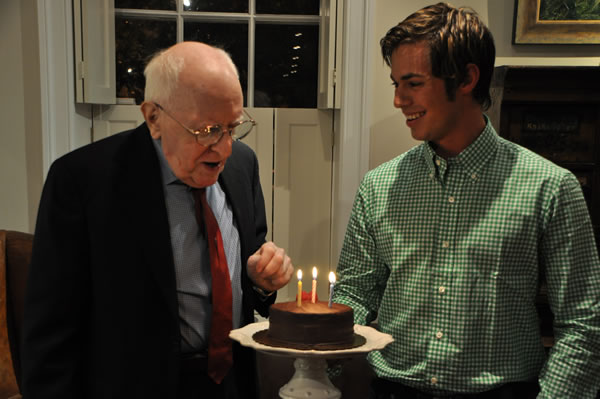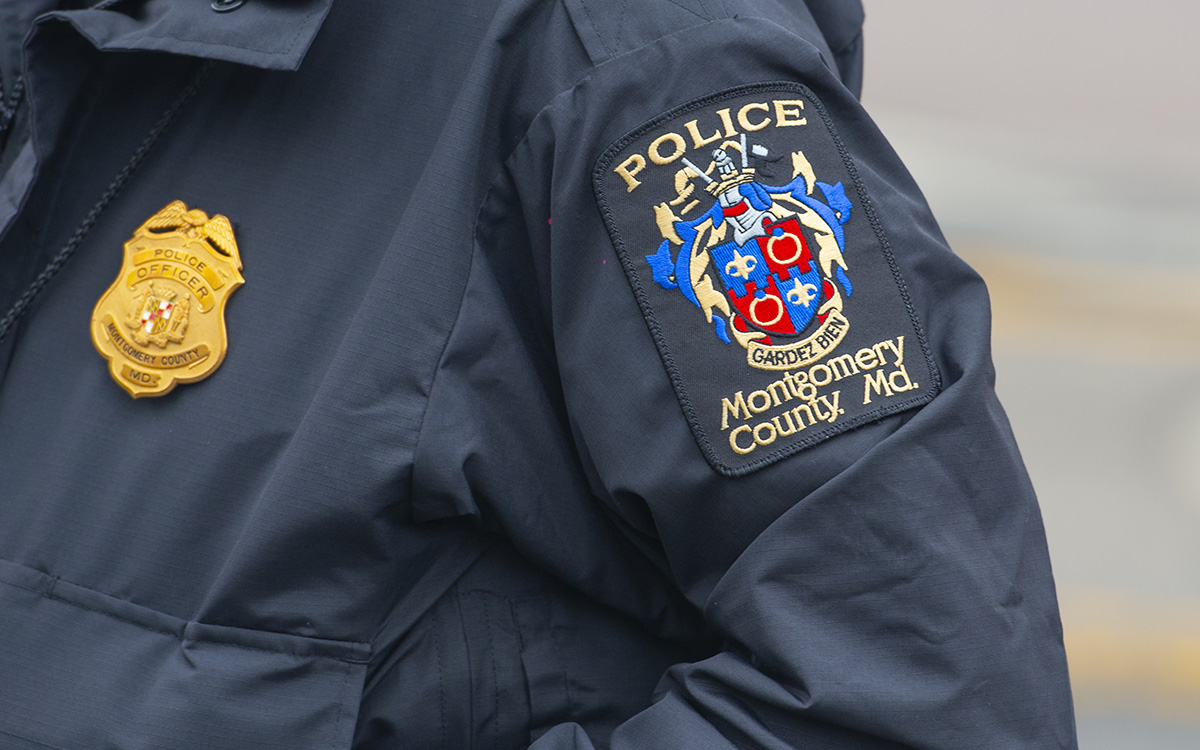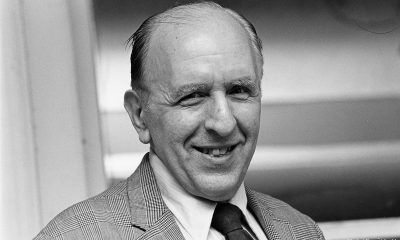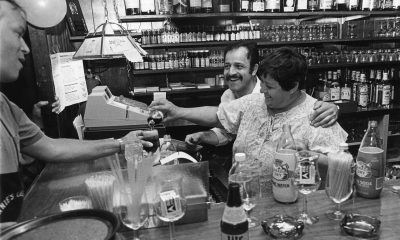Local
Kameny’s work finds new home
Library of Congress to preserve gay activist’s 70,000 letters, documents

Veteran D.C. gay rights leader Franklin E. Kameny has turned over more than 70,000 of his personal letters and documents to the Library of Congress, which will make them available to scholars and researchers.
At a ceremony scheduled for Oct. 6 at the library’s ornate Thomas Jefferson Building across the street from the U.S. Capitol, library officials were expected to join Kameny and many of his longtime friends and supporters to commemorate the library’s acquisition of the Kameny papers.
Kameny, 81, is credited with playing a lead role in launching the modern U.S. gay rights movement in the early 1960s after government officials discovered he was gay and fired him from his job as an astronomer with the Army Map Service.
In what gay activists see as a monumental twist of fate, the product of Kameny’s work on gay rights causes for nearly 50 years will now be placed in the same Library of Congress Manuscript Division that holds original documents of Frederick Douglas, Abraham Lincoln, Walt Whitman, Susan B. Anthony, and Bayard Rustin, among many other historic figures.
The Smithsonian Institution’s Museum of American History also has accepted a collection of 1960s-era protest and picket signs from the Kameny collection that Kameny and his supporters used for the nation’s first-ever gay rights demonstrations in front of the White House.
“After examining the Kameny papers, Manuscript Division historians judged them to be a rich and valuable resource that would allow researchers to more accurately understand the evolution of the homosexual rights movement into a significant social and political force,” said John Earl Haynes, a 20th century political historian at the Manuscript Division.
“The personal detail provided by the material on Mr. Kameny himself and those he assisted in similar circumstances is of unusual value,” Haynes said.
“Nearly 50 years go, the United States government banned me from employment in public service because I am a homosexual, Kameny said in a statement. “This archive is not simply my story,” he said. “It also shows how gay and lesbian Americans have joined the American mainstream story of expanded civil liberties in the 20th century.
“Today, by accepting these papers, the nation preserves not only our history, but marks how far gay and lesbian Americans have traveled on the road to civil equality,” he said.
Haynes said officials with the Manuscript Division first contacted Kameny about obtaining his papers in 1995 after they read an article about Kameny’s work by gay historian David K. Johnson. The article appeared in the official journal of the Historical Society of Washington.
Documents valued at $75,000
Earlier this year, a group of gay rights advocates and supporters founded the Kameny Papers Project, an ad hoc group created to raise money to facilitate the transfer of the papers to the library, according to gay public relations executive Charles Francis, the lead organizer of the project.
Francis said the group’s main purpose was to raise funds to buy the papers from Kameny — so that he could be compensated for his life’s work — and then donate the documents to the Library of Congress.
Its first task was to help Kameny assemble the papers in or orderly fashion and to have them appraised by a professional document appraiser. The appraiser determined the papers had significant historic value and were worth $75,000.
“With advancing years and limited means, Frank Kameny was not eligible for a federal tax deduction, as is common with such an extraordinary donation,” the Kameny Papers Project said in a statement.
Former California congressman and philanthropist Michael Huffington made the single largest contribution toward the purchase of the papers from Kameny, Francis said. He said the Human Rights Campaign, the nation’s largest gay political group, and the gay groups Gill Foundation, Bohnett Foundation, Log Cabin Republicans, Liberty Education Fund, and the National Gay & Lesbian Task Force also contributed to the fund.
Others firms and individuals that provided pro-bono services or contributions included Francis, New York gay businessman Donald Capoccia, the gay public relations firm Witeck-Combs Communications, the Joiner Law Firm, attorney Michele Zavos, and activists Gregory King, Elizabeth Koontz, and Ellen Ratner, according to the Kameny Papers Project.
Huffington and Capoccia have been longtime contributors to Log Cabin Republicans, and Francis is one of the founders of the Republican Unity Coalition, which has billed itself as a gay-straight alliance of prominent Republicans that support gay civil rights.
Kameny vs. J. Edgar Hoover
Gay historians have described Kameny as the architect of the modern U.S. gay rights movement, crediting him with transforming the fledgling “homophile” movement of the 1950s into an assertive civil rights struggle for gays and lesbians.
Most gay activists view the 1969 Stonewall riots in New York’s Greenwich Village as the spark that ignited a new phase in the gay movement that celebrated the slogan, “Out of the closet and into the streets.”
But gay historians like Johnson have credited Kameny with establishing, beginning in 1961, the philosophical and tactical underpinnings for the Gay Pride marches and political advocacy work that followed the Stonewall riots.
Kameny was the gay movement’s equivalent of Bayard Rustin, according to D.C. gay activist Rick Rosendall, in referring to Rustin’s role as a lead strategist for Martin Luther King in the black civil rights movement.
Shortly after being fired from his job at the Army Map Service, Kameny founded the Mattachine Society of Washington, the city’s first gay rights group. Kameny initially modeled the group after Mattachine Society chapters that had formed since 1950 in Los Angeles and other cities.
In some of his earliest papers now preserved at the Library of Congress, Kameny took exception to the prevailing view by Mattachine Society leaders that the groups should keep a low profile. Nearly all of the early Mattachine groups limited their work to research about homosexuality, educating the public on the subject, and helping other homosexuals adjust to society’s anti-gay prejudice, Johnson wrote in his 2003 book, “The Lavender Scare: The Cold War Persecution of Gays and Lesbians in the Federal Government.”
“Under Kameny’s leadership, the MSW would not remain underground and seek heterosexual authorities to speak on its behalf,” Johnson wrote. “On issues of homosexuality, Kameny argued, ‘we are the experts and the authorities.’” Johnson quoted him as saying.
Among Kameny’s innovations was the publication of a Mattachine Society of Washington newsletter, which the group sent to most top U.S. government officials, including President John F. Kennedy at the White House and all of Kennedy’s cabinet members, and then FBI Director J. Edgar Hoover.
Although most government officials did not appear to pay much attention to the newsletter, Kameny said he was startled in the summer of 1963 when FBI agent John A. O’Birne called Kameny by phone and requested to meet with him.
Kameny said he and Mattachine Society member Bob Bellanger had no idea why they had been summoned to a meeting with the FBI, an the two wondered whether a crackdown against Mattachine was in the works.
To their amazement, Kameny said, O’Birne politely asked him and Bellanger to remove Hoover’s name from the Mattachine Society mailing list, saying that Hoover did not wish to have his name on such a list. Kameny said he told O’Birne that he would have to consult other members of the group about this request and would get back to the FBI with the group’s response.
“I sent them a letter setting conditions for our removal of Hoover from our list,” said Kameny.
The conditions included a requirement that the FBI provide the group with the name of another FBI official to be placed on the newsletter list in place of Hoover and that the group would reserve the right to send Hoover a one-time mailing if an important issue arose.
The FBI never responded to Kameny’s letter. “Hoover stayed on our mailing list until the day he died,” said Kameny.
Hoover, who became notorious for keeping secret files on political activists and politicians – including President Kennedy – appears to have had the tables turned on him by discovering he was powerless to have him name removed from a homosexual rights group, gay activists have said.
In the 1970s and 1980s, Kameny served as an administrative counsel to gays who encountered problems obtaining or keeping security clearances issued by the federal government, becoming one of the nation’s recognized experts on gay-related security clearance issues. He also represented members of the military under investigation for being gay. In advising gay service members, Kameny coined the phrase, “Say nothing, sign nothing, and get counsel.”
He is also credited with creating the slogan, “Gay is Good,” which activists used in protest marches and Gay Pride festivals.
Maryland
Montgomery County police chief discusses arrest of trans student charged with planned school shooting
County executive tells news conference student’s trans identity is irrelevant to criminal charge

Montgomery County, Md., Police Chief Marcus Jones joined other county and law enforcement officials at a news conference on Friday, April 19, to provide details of the police investigation and arrest of an 18-year-old high school student charged two days earlier with threats of mass violence based on information that he allegedly planed a mass shooting at the high school and elementary school he attended in Rockville, Md.
In charging documents and in a press released issued on April 18, Montgomery County Police identified the arrested student as “Andrea Ye, of Rockville, whose preferred name is Alex Ye.”
One of the charging documents states that a friend of Ye, who police say came forward as a witness who played a crucial role in alerting authorities to Ye’s threats of a school shooting, noted that Ye told the witness that Ye identified as the transgender student he wrote about as a character in a 129-page manifesto outlining plans for a school shooting. Police have said Ye told them the manifesto was a fictional story he planned to publish.
At the news conference on Friday, Police Chief Jones and other law enforcement officials, including an FBI official and Montgomery County Executive Marc Elrich, referred to the student as Alex Ye and Mr. Ye. None of the officials raised the issue of whether Ye identified as a transgender man, seven though one of the police documents identifies Ye as a “biological female.”
County Executive Elrich appeared to express the views of the public officials at the news conference when one of the media reporters, during a question-and-answer period, asked Elrich why he and the others who spoke at the news conferment failed to “admit that this individual was transgender.”
“Because it’s not a lead,” Elrich replied, asking if the press and law enforcement authorities should disclose that someone arrested for murder is “a white Christian male who’s heterosexual.” Elrich stated, “No, you don’t – You never publish somebody’s sexual orientation when we talk about this. Why you are focusing on this being a transgender is beyond me. It’s not a news story. It is not a crime to be transgender.”
The reporter attempted to respond but was cut off by the press conference moderator, who called on someone else to ask the next question.
In his remarks at the press conference Chief Jones praised the so far unidentified witness who was the first to alert authorities about Ye’s manifesto appearing to make threats of a mass school shooting.
“Now, this is a situation that highlights the critical importance of vigilance and community involvement in preventing potential tragedies,” Jones said. “I commend the collaborative efforts of the Montgomery County Police Department, the Federal Bureau of Investigation, the Rockville City Police Department, and the Montgomery County Public Schools, as well as Montgomery County Health and Human Services,” he told the gathering.
“Thanks to their swift action and cooperation a potentially catastrophic event was prevented,” Jones said.
Jones pointed out that during the current school year, police have received reports of 140 threats to the public schools in Montgomery County. He said after a thorough investigation, none of them rose to the level where an arrest was made. Instead, police and school officials took steps to arrange for the student making the threats and their parents to take remedial action, including providing mental health services.
“But this case is different,” Jones said. “This case is entirely different that takes it to a different level. It was a concerned witness who brought this matter to light by rereporting the suspect’s manifesto to the authorities. This underscores the value of community engagement and the ‘see something say something’ approach,” he said.
Jones mentioned at the press conference that Ye was being held without bond since the time of his arrest but was scheduled to appear in court for a bond hearing on Friday shortly after the press conference took place to determine whether he should be released while awaiting trial or continue to be held.
In his manifesto obtained by police, Ye writes about committing a school shooting, and strategizes how to carry out the act. Ye also contemplates targeting an elementary school and says that he wants to be famous.
In charging documents reported on by WJLA 7 and WBAL 11, the 129-page document, which Ye has referred to as a book of fiction, included writings that said, in part:
“I want to shoot up a school. I’ve been preparing for months. The gun is an AR-15. This gun is going to change lives tomorrow … As I walk through the hallways, I cherry pick the classrooms that are the easiest targets. I need to figure out how to sneak the gun in. I have contemplated making bombs. The instructions to make them are surprisingly available online. I have also considered shooting up my former elementary school because little kids make easier targets. High school’s the best target; I’m the most familiar with the layout. I pace around my room like an evil mastermind. I’ve put so much effort into this. My ultimate goal would be to set the world record for the most amount of kills in a shooting. If I have time, I’ll try to decapitate my victims with a knife to turn the injuries into deaths.”
Maryland
Rockville teen charged with plotting school shooting after FBI finds ‘manifesto’
Alex Ye charged with threats of mass violence

BY BRETT BARROUQUERE | A Montgomery County high school student is charged with what police describe as plans to commit a school shooting.
Andrea Ye, 18, of Rockville, whose preferred name is Alex Ye, is charged with threats of mass violence. Montgomery County Police and the FBI arrested Ye Wednesday.
The rest of this article can be found on the Baltimore Banner’s website.
District of Columbia
New D.C. LGBTQ+ bar Crush set to open April 19
An ‘all-inclusive entertainment haven,’ with dance floor, roof deck

D.C.’s newest LGBTQ+ bar called Crush is scheduled to open for business at 4 p.m. on Friday, April 19, in a spacious, two-story building with a dance floor and roof deck at 2007 14th St., N.W. in one of the city’s bustling nightlife areas.
A statement released by co-owners Stephen Rutgers and Mark Rutstein earlier this year says the new bar will provide an atmosphere that blends “nostalgia with contemporary nightlife” in a building that was home to a popular music store and radio supply shop.
Rutgers said the opening comes one day after Crush received final approval of its liquor license that was transferred from the Owl Room, a bar that operated in the same building before closing Dec. 31 of last year. The official opening also comes three days after Crush hosted a pre-opening reception for family, friends, and community members on Tuesday, April 16.
Among those attending, Rutgers said, were officials with several prominent local LGBTQ organizations, including officials with the DC Center for the LGBTQ Community, which is located across the street from Crush in the city’s Reeves Center municipal building. Also attending were Japer Bowles, director of the Mayor’s Office of LGBTQ Affairs, and Salah Czapary, director of the Mayor’s Office of Nightlife and Culture.
Rutgers said Crush plans to hold a grand opening event in a few weeks after he, Rutstein and the bar’s employees become settled into their newly opened operations.
“Step into a venue where inclusivity isn’t just a promise but a vibrant reality,” a statement posted on the Crush website says. “Imagine an all-inclusive entertainment haven where diversity isn’t just celebrated, it’s embraced as the very heartbeat of our venue,” the statement says. “Welcome to a place where love knows no bounds, and the only color or preference that matters is the vibrant tapestry of humanity itself. Welcome to Crush.”
The website says Crush will be open Tuesdays and Wednesdays from 4 p.m. to 12 a.m., Thursdays from 4 p.m. to 2 a.m., Fridays from 4 p.m. to 3 a.m., Saturdays from 2 p.m. to 3 a.m., and Sundays from 2 p.m. to 12 a.m. It will be closed on Mondays.
Crush is located less than two blocks from the U Street Metro station.
-

 Africa5 days ago
Africa5 days agoCongolese lawmaker introduces anti-homosexuality bill
-

 District of Columbia2 days ago
District of Columbia2 days agoReenactment of first gay rights picket at White House draws interest of tourists
-

 District of Columbia1 day ago
District of Columbia1 day agoNew D.C. LGBTQ+ bar Crush set to open April 19
-

 World5 days ago
World5 days agoOut in the World: LGBTQ news from Europe and Asia












